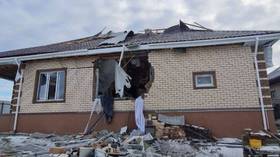The global economy was deathly sick long before now, but Covid-19 will take the blame if it crashes
As economists begin to predict what the global economic effects of Covid-19 will be, the danger is we play up the economic damage of the virus while hiding the deep-rooted sources of our contemporary financial doldrums.
It is inevitable that economic forecasts of the impact of Covid-19 on the global economy are being revised daily, if not hourly. It is right that economic forecasters should be updating their predictions. But we all need to keep in mind that these revised forecasts are little more than guesswork – however sophisticated their computer modelling might be.
Also on rt.com Wall Street’s big coronavirus mistakeThis is not prejudice against economists, the experts Michael Gove in particular referred to when he said during the Brexit referendum that the British people had had enough of them –referring specifically to their shaky prediction track record. Economic predictions and forecasting are notoriously difficult. It is the reason why leading economist JK Galbraith once quipped that the only function of economists was “to make astrology look respectable.”
We are going to see a proliferation of astrology in the days ahead. The biggest danger is going to be the battle to avoid economic alarmism.
The division of labour between health officials and economic experts is increasingly being blurred. Health officials are being asked about economic impacts, while economists are being called to make predictions about the impact of the disease. Health and economics are being conflated, which is confusing for all; what should be treated as a medical emergency is increasingly becoming a sphere for urgent government economic bailouts and politics aimed at alleviating the fall-out of lockdowns.
These confusions aside, predicting the economic costs of ill-health is very difficult. The Co-Operative Pharmacy reported in 2010, for example, that flu cost UK employers 7.6 million working days this year. It estimated that the cost to the economy was around £1.35 billion. But no-one even really knows the economic costs of these ‘normal’ diseases. Annual deaths precipitated by influenza are much higher than the deaths from coronavirus so far. According to Public Health England, in an average year about17,000 people in England die from flu complications, of which around four-fifths are over 65. But the numbers vary wildly from one year to the next. The relative effects on British gross domestic product (GDP) of a high flu death year compared to a low death year might keep economic modellers busy, but the actual effect gets lost in the longer-term influences and trends.
But there are things we know which should be at the forefront of our considerations. The world economy was already in deep ill-health before anyone had even heard of Covid-19. Losing sight of this means the remedies on offer might be good at stemming the symptoms of a problem, but they ignore the underlying cause, the real source of the malaise, which will remain untreated. This will be worse in the long run than any short-term dislocations we are forced to endure.
The world economy has been, if not on life-support, terminally ill for years. Global growth – and especially advanced-economy growth – this year was already dismal, and has been for many years. Forecasts for this year were already pretty downbeat before most people were aware of the word ‘coronavirus’.
The illness is the result of years of diminishing business investment in new technologies and ways of operating, and the propping up by governments of companies that should have gone out of business. The end result? Almost stagnant productivity. People at work are no longer producing more in the same time. This is a significant break from the dominant pattern during the past two centuries of economic expansion. This waning in productivity growth – sinking to little more than flatlining in Britain – is what accounts for most people no longer benefiting from regular increases in living standards.
It is also what has led to the increased dependence on debt and financialisaton. The 2008 crash confirmed the fragility of economic systems that rely too much on borrowing and too little on creating new wealth. We are not in permanent recession, but we are stuck in a cycle of financial crises. Between the crashes, debt keeps things ticking along. The unstable dissonance between the financial and productive economies – reflected in the inflated stock markers – reveal that an adjustment was inevitable. The dramatic falls in global stock markets over the past two weeks were on the cards before the impact of Covid-19 panic set in.
Also on rt.com Global stock markets plunge despite drastic action by governments as coronavirus paralyses economiesThe biggest unknown, and perhaps where all the economists’ astrology-powers will be focused, is whether the current market ‘adjustment’ will develop into a bigger financial implosion which will lead to a global recession.
One prediction you can be sure of, whatever happens: everyone will be quick to blame this on Covid-19, not the underlying structural weakness of the global system. The real patient will be ignored by immediate palliatives. But unless – and until – the terminally ill global economy is given a real reboot, rather than left to stagnate in a corridor out of sight, the world will be less able to deal with what is, after all, a severe health crisis – today and especially in the future.
Like this story? Share it with a friend!
The statements, views and opinions expressed in this column are solely those of the author and do not necessarily represent those of RT.












